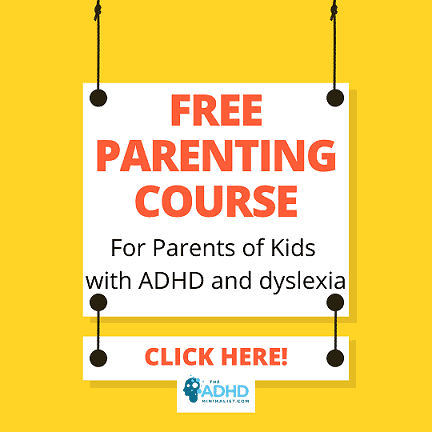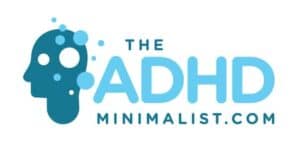
Feeling guilty for conflicting emotions is normal! It’s ok to grieve for the hopes and dreams you had for your child. Dreams that will never be! It doesn’t mean you love your child less, and it doesn’t make you a bad parent. Be sad, have periodic cries, then let love conquer all and put one foot in front of the other.
I’ll never forget hearing my child has ADHD that day, I sat in a white room surrounded by three specialists listening to the results of extensive testing. Despite the number of people in the room, I’ve never felt so alone. They drew charts explaining strengths, weaknesses, and test results. Information I knew I needed to remember, but I could barely take in through my tears.
On the drive home, all I could think about was how to tell my son he had ADHD. How do you tell someone they’re different from their peers? How do you tell a child they’ll carry a label for life?
I called my husband and cried on the phone. He worked seven hours away from home that week and explaining ADHD to our son fell to me.
At that point in time, I never dreamed I’d find myself in that same office three years later, this time with my daughter by my side. At least the experts helped explain the situation to her. They were good at what they did, she took it well, but I couldn’t cry; I had to be strong for her. I held my emotions in check for days till a friend asked me how I was, then I completely lost it!
My grieving didn’t stop here. It came in waves. I’ve grieved (and am grieving) that my kids’ self-sabotage fun events and that eating typical family meals is nearly impossible, that homework is terribly frustrating, that my kids struggle socially, and that I feel inadequate.
I’ll probably grieve till the day I die. I’ll also do everything in my power to help my kids succeed!
A poem I found several years ago compares having a child with special needs to planning a trip, but when the plane lands, you find it changed course, and you’ll have to change your plans.
In the end, it was self-care (Not the self-care you typically hear about) that saved me from depression.
Things were so bad at home that I didn’t think I could get a babysitter, but I called friends and family each week, and somehow it always worked out, and I got a much-needed respite.
If you think it’s hopeless for you to get away from those you care for, please read my posts before writing the idea off completely. It may be just what you need!

You can read about what helped me below.

Not everyone agrees on how many stages of grief there are. Grieving is personal, and everyone experiences these stages differently.
With my son, I always had a feeling something was wrong, and after the initial shock of his diagnosis, I was relieved to know what I was. I was never in denial.
When my daughter was in first or second grade, her teacher thought we should get her accessed for ADHD inattentive, and I completely denied that she was having problems in school.
This was partly due to my own experience of having trouble reading and sitting still in school. I just figured it would work itself out, but it didn’t. It turned out she had ADHD inattentive and was very dyslexic. It’s hard to know where one problem stops and another starts. My sequence of emotions was very different the second time around.
If your grieving process doesn’t follow this exact order, that’s ok. It’s your process. You are unique, and therefore your grieving process is unique.

1. Shock is the first stage of grief.
The first stage of grieving is often shock unless you, like me, deny that the problems existed!
Parents waiting to hear if their beloved child has a diagnosis are taut as bow-strings and on the verge of emotional explosions. Listening to such devastating news is so painful you can barely force yourself to stay in the room!
No matter how much you think you’re prepared for the news, you can never be completely prepared or sure of your reactions. It’s not that parents mean to be distant, rude, emotional, doubtful, or uncomprehending when hearing about their child’s diagnosis; they are simply in shock.

2. Denial and doubt phase two in the grieving process.
I was in denial when my daughter’s teacher suggested putting her on the ADHD and Dyslexia screening list. I wanted to wait six months and see if she progressed in reading and writing before considering screening.
I had a horrible time learning to read as a kid, and even when I started reading, I couldn’t read books for my age level. It turned out to be eye problems, so I ignored the teacher and took my daughter to the eye doctor. She did get glasses, but that didn’t fix all the issues. Six months later, I put her on the screening list.
I always encourage parents to check things out right away. If there is a waiting list, put your child on it immediately if the issue resolves itself. Give your spot to the next child in line. When you’re not sure, go ahead with the screening; if it’s a nonissue, then you’ll know and not wonder. If your child needs a diagnosis, the sooner you get help, the better.
I know parents who arrived at meetings armed to the hilt with their own research trying to disprove a doctor’s diagnosis. Being in doubt can have its advantages if you have the money to check with several specialists, but your average Joe doesn’t have that kind of money.
Having doubts about a child’s diagnosis is a common reaction for parents, but doubt becomes a problem when parents can’t move past doubt in their grieving processes.
Parents stuck in doubt and denial try to explain their child’s behavior or learning delay in another way. They may completely disregard the examination results av professionals and present their own version of the problem to teachers and friends.
What is sad about parents stuck in denial is the child goes untreated for months or years.
This is by far the worst stage of grief for the child. Many times early intervention is critical. In some cases getting help in early childhood is the difference between the child learning to cope or not.
Denying loses critical time, time you can never get back. Sadly some parents never get over this stage of grief, and the biggest loser is the child.
A parent of special needs kids needs to be an advocate for their child. That can’t happen until parents come to terms with their child’s diagnosis.

3. Anger, sadness, and blame – the third stage of grieving.
It’s in our human nature to look for a scapegoat when we find ourselves between a rock and a hard place. The problem is there may not be one.
Many times the parents of special needs kids did everything right! They work out, eat healthily, did pregnancy by the book, and still, a stroke of nature changes chromosomes or genes, or an accident sent their lives on a different path. There may be no one to blame, and even if there is blaming and bitterness won’t help you or your child cope with the difficult days ahead.
Blaming or focusing your anger on teachers, medical professionals, your spouse, or your family only drives a wedge between you and the people you need on your team the most. Your child is the ultimate loser.
It’s common for bickering and arguing to break out between partners. They try to come to terms with their own resentment, anger, and sadness, which spills out over those they love most.
Eventually, this chain reaction focuses a parent’s anger on themselves and sometimes their child.
Once in this stage, parents come to terms with the fact that they can no longer deny the inevitable. Their child has a diagnosis or disability. Parents begin working with professionals and teachers to get their child needed help, but they often haven’t come to terms with the diagnosis and don’t want to make it public.
Keeping this information to themselves alienates parents from family and friends. They know they are not doing well and that it’s evident to anyone who knows them. Being social will provoke questions they aren’t prepared to answer. Thus, they shut the world out and become prisoners in their own homes.
From my own experience, I know that being socially isolated may be thrust upon parents, not a choice they make. Either way, it’s incredibly lonely and hard to cope with.
We slowly told family and friends that our kids had ADHD and Dyslexia, but we didn’t explain how bad things were at home. The kids had panic attacks that lasted up to three hours, and at times my husband and I had to call the other at work to come home immediately because things were so bad with one child we couldn’t look after the other children and deal with panic attacks at the same time.
When we finally decided to come clean about how bad it was in order to ask extended family for help, several close family members didn’t believe us!
I’ve felt extremely isolated when my kids didn’t function socially. When going out, my kids self-sabotaged even when we would do fun things, and it didn’t always work to have people over! What do you do? It was actually a form of self-care that kept me from falling apart. You can read about that here https://theadhdminimalist.com/20-ways-to-take-care-of-yourself-while-caring-for-others/ and here https://theadhdminimalist.com/aspects-of-self-care-that-we-often-ignore/.
Parents may even try to isolate themselves from each other. During this stage, the marriage becomes stressed.
If you want to reduce your chances of divorce, it’s best to have your eyes wide open and seek counseling as a couple early in this process. It’s now thought that parents of autistic children have a 10% higher divorce rate. Researchers believe that 41% of all first marriages end in divorce, which makes the divorce rate for parents of autistic children 51%.
Parents need to work through their anger and sadness together without blaming each other. If they can lean on one another and get through the worst times, they often create a stronger bond as they help their special needs child. For those who stick it out, their marriages often flourish.

4. Guilt and Bargaining are prominent in the fourth grieving phase.
Guilt and bargaining go hand in hand. Parents are angry at themselves and feel guilty because they think they caused their child’s disability or diagnosis.
Parents often assume they are a terrible parent and their child’s illness, disability, or diagnosis it’s due to something they did wrong.
Did they eat the wrong thing during pregnancy? Do they have bad genes? Were they exposed to toxins at work? Could the problem stem from faulty pare ting? What did they do wrong? They may feel sorry for their child and wonder how they never noticed the symptoms. Why didn’t they realize their child needed help sooner?
Often guilt sparks appealing to a higher power. This stage of grief involves the hope that somehow the child can be cured. Parents plead to a higher power, “I’ll do whatever you want if you’ll cure my child and let him/her be like other children.”
I am not against prayer; I’ll take all the prayer I can get, but parents promising God things in exchange for healing their child is often a form of self-punishment. It’s guilt-driven. Parents may be driven by guilt even if there is nothing to feel guilty for. Sometimes accidents just happen, extra chromosomes appear, cancer prevails, and kids inherit bad genes. We can pray for kids to get better without guilt and pointing fingers.
I may be going out on a limb here. Still, I feel the church can put so much focus on believing the sick will get better that they inadvertently encourage parents of special needs kids not to accept that their child has a diagnosis, illness, or disability.
I’m not suggesting that everyone stop praying, but a special needs parent needs to hear concrete offers for help. For instance, “I can come babysit next Tuesday at 14:00 if you’d like to get out of the house for a couple of hours.”
I bet offers like these bring tears to parents’ eyes! If you want to help, be specific and know when you can help before you offer. Parents of special needs kids are often too exhausted to call around for a babysitter just so they can have a few hours to rejuvenate. If you loosely say you can help and tell them to call you, they probably won’t call.
Learning your child’s unique abilities can help parents get out of this phase of grief. Special needs parenting has unique joys! Through therapies, trying new things, practicing, and sometimes plain old trial and error helps you learn what makes your child special and what their unique contribution to the world is.

5. Depression creeps in during the fifth stage of grief.
If parents haven’t yet realized they aren’t to blame, it can trigger depression. There are many reasons for depression for some parents; it may stem from blaming themselves for others depression is the beginning of acceptance.
Realizing your child has special needs, that it’s not your fault, and that you don’t have the power to fix it can make you depressed for a time, but it ultimately leads to acceptance.
It’s tough to help parents out of depression if they continually blame themselves. Blame disables logic and common sense. Trying to cheer a person in this state is almost impossible. Sometimes there isn’t anything anyone can do to help. Each parent must realize on their own that they are not to blame.
When truth is sinking in is the reason for depression, it’s similar to what those who lose a loved one to death face. Parents mourn the loss of their idyll child, the child they thought they knew as they cared for him as a baby. The truth is reality isn’t what they hoped. When they held their baby in their arms, they had hopes and dreams of their future together, and losing that hurts. They are grieving as if someone had died. And in fact, someone did. Their idea of their idyll child had to die in order to accept reality and move on.
When you get to the other side of depression, you can see sparks of joy in everyday life. They may be tiny sparks at first, but they’ll grow.

6. Shame, feeling your child is a reflection of you, the sixth phase of grief.
One reason for shame is parents haven’t stopped blaming themselves and feel ashamed because they insist their child’s diagnosis, disability, or illness is their fault. I’m focusing on another reason for shame – feeling that your child is an imperfect reflection of you.
Many parents see their children as extensions of themselves. Often the idea that your child is connected to you, a reflection of you, or an extension of you isn’t a conscious thought. It’s a way of thinking so deeply ingrained that we don’t see it. Even if parents can’t put their finger on it or explain it, that thought makes it easy for them to get sucked into their child’s feelings and emotions and feel as their child feels.
It took me a long time to realize that no one was forcing me to do poorly just because my son was doing poorly.
I’m not my son, and he isn’t me. We can lean on each other and help each other, but I don’t have to feel depressed just because my child is depressed.
If I always eco my child’s emotions, I am not much help when he needs a rock to lean on.
This negative emotional cycle causes feelings of shame because parents believe their child reflects themselves; they tend to take everything personally. They may overreact when a teacher corrects their child or feel that children on the playground are pointing a finger at their child and them as well. Parents may feel ashamed of their child’s hyperactive behavior or worry that other parents won’t like their ball of energy.
There are many feelings and emotions parents of special needs kids must come to terms with. Realizing that I am separate from my child and I can do well emotionally even if my child is an emotional wreck saved me from many an emotional roller coaster.
Yes, it’s frustrating when kids have bad days, and I can get sucked into an emotional vortex at times, but I’ll never forget the day I realized I didn’t have to feel panicked just because my child was panicking. I am a separate entity with the ability to control my own responses and emotions.

7. Acceptance, the first Step Towards Seeing your Child’s Unique Abilities! Grieving stage seven.
When parents learn about their child’s unique abilities (things they are good at) and learn how to help their child with disabilities, they learn to accept the child the way he/she is. Parents who arrive at this point feel relief, and they can let shame and blame roll off their backs and take the next step.
Parents allow themselves to dream again. They can see the beauty in their child, and they find the strength to buckle down and do the hard work of raising a child with special needs.
The ability to see your child as who they are and not color their life with your preconceived ideas is a gift.
You may find yourself in this grieving process more than once as life unfolds. That doesn’t make you a lousy parent. You are only human.

8. Empowerment, Finding the Courage and the Tools to Help Your Child. The last Stage of Grief.
Parents learn to cope with the parenting challenges. They begin to see their child with special needs and as a child with unique abilities. Reading and studying become second nature as they learn how to help their child. They team up with teachers and professionals, and as their child grows, new challenges come and go. Never stop learning and trying to help your child have the best life possible.
At this point, parents have a wealth of knowledge and become a rock for new parents who find themselves struggling with diagnoses, disabilities, or illnesses.
New parents realize that they can get through their grief and difficulties because others have done it!
Check out my post on self-care it helped me through some difficult times.
Copyright Annie Eklöv
sources
https://www.parentcompanion.org/article/understanding-the-stages-of-grief

